J.flanagan
WKR
- Joined
- Oct 10, 2022
- Messages
- 354
Everything that follows is based on the opinions, experience, and observations of a very new and inexperienced backcountry hunter.
November 2022, my brothers and I decided to start planning a OTC elk hunt in Colorado. We had talked about it off and on for the past few years but decided to turn the dream into a reality. We are all semi outdoorsy and grew up car camping but a backcountry camping/hunting trip wasn't something any of us had experience with.
We all live in the Tampa Florida area and range in age from 26 to 33. All of us are fairly healthy and engaging in moderate activitie regularly. None of us are fitness junkies. I don't think any of the 4 of us work out regularly. We just stay activitie in our lives, hobbies, and jobs.
We had lofty goals of working out a lot and getting in top shape but the realities of life made that difficult. I'm working on remodeling a house, my wife and I had a newborn, and I help run a small business, even squeezing an hour or two out of every week wasn't possible. I'd run/ruck for a couple weeks then 2 months would pass without me doing any physical prep. As a side note, it's a bit harder to prep for mountain hiking when you live in the flat lands. I settled on running and then rucking with a bunch of lunges.
I didn't realize how much the gear was going to cost. It's nice to have the best of the best gear but in reality, it's not necessary. I probably went overboard and could have gone with lower quality gear. I'll post a gear list and rough weight at the end. Of course there are ways to cut cost.
-Hunt the early seasons to reduce the cold weather gear you will need.
-Buy used gear and shop the sales for anything new you want.
-Don't feel the need to get all your gear from the big hunting brands.(a Patagonia fleece sweater is probably going to work just as well as a Sitka fleece)
-Dont buy it all at once, spread the cost out over a year or two. Easier to budget for everything that way.
We had no clue what we were doing and had a year to figure it out. We spent a lot of time e-scouting on gohunt and scouring forums for any useful info we could find. We learned a lot but there is no substitute for actually getting out there. Everyone told us to go scout ahead of time and "put boots on the ground" but that just wasn't an option.
While escouting we picked out a flat spot a couple hundred yards off the main hiking trail for our camp and then a series glassing spots 0.5 miles to 6 miles away from camp. Escouting is a valuable tool but it does not give you a perfect picture of what you are getting into. Be ready to pick a different camp spot than you planned and be ready to move your glassing points around.
November 2022, my brothers and I decided to start planning a OTC elk hunt in Colorado. We had talked about it off and on for the past few years but decided to turn the dream into a reality. We are all semi outdoorsy and grew up car camping but a backcountry camping/hunting trip wasn't something any of us had experience with.
We all live in the Tampa Florida area and range in age from 26 to 33. All of us are fairly healthy and engaging in moderate activitie regularly. None of us are fitness junkies. I don't think any of the 4 of us work out regularly. We just stay activitie in our lives, hobbies, and jobs.
We had lofty goals of working out a lot and getting in top shape but the realities of life made that difficult. I'm working on remodeling a house, my wife and I had a newborn, and I help run a small business, even squeezing an hour or two out of every week wasn't possible. I'd run/ruck for a couple weeks then 2 months would pass without me doing any physical prep. As a side note, it's a bit harder to prep for mountain hiking when you live in the flat lands. I settled on running and then rucking with a bunch of lunges.
I didn't realize how much the gear was going to cost. It's nice to have the best of the best gear but in reality, it's not necessary. I probably went overboard and could have gone with lower quality gear. I'll post a gear list and rough weight at the end. Of course there are ways to cut cost.
-Hunt the early seasons to reduce the cold weather gear you will need.
-Buy used gear and shop the sales for anything new you want.
-Don't feel the need to get all your gear from the big hunting brands.(a Patagonia fleece sweater is probably going to work just as well as a Sitka fleece)
-Dont buy it all at once, spread the cost out over a year or two. Easier to budget for everything that way.
We had no clue what we were doing and had a year to figure it out. We spent a lot of time e-scouting on gohunt and scouring forums for any useful info we could find. We learned a lot but there is no substitute for actually getting out there. Everyone told us to go scout ahead of time and "put boots on the ground" but that just wasn't an option.
While escouting we picked out a flat spot a couple hundred yards off the main hiking trail for our camp and then a series glassing spots 0.5 miles to 6 miles away from camp. Escouting is a valuable tool but it does not give you a perfect picture of what you are getting into. Be ready to pick a different camp spot than you planned and be ready to move your glassing points around.
Attachments
-
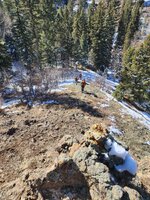 20231101_130337.jpg837.5 KB · Views: 112
20231101_130337.jpg837.5 KB · Views: 112 -
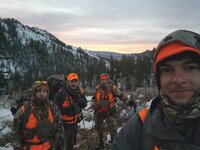 20231101_181843.jpg302.4 KB · Views: 105
20231101_181843.jpg302.4 KB · Views: 105 -
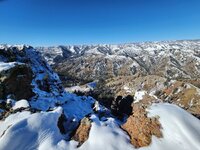 20231031_103423.jpg471.4 KB · Views: 102
20231031_103423.jpg471.4 KB · Views: 102 -
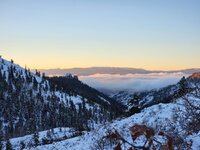 20231031_074116.jpg388.5 KB · Views: 105
20231031_074116.jpg388.5 KB · Views: 105 -
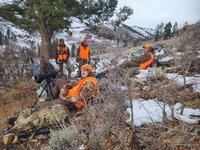 20231101_171128.jpg673.6 KB · Views: 105
20231101_171128.jpg673.6 KB · Views: 105 -
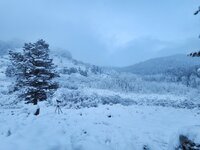 20231029_075406.jpg287.7 KB · Views: 105
20231029_075406.jpg287.7 KB · Views: 105 -
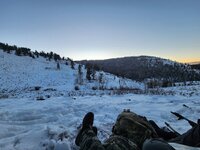 20231031_074204.jpg322.2 KB · Views: 109
20231031_074204.jpg322.2 KB · Views: 109 -
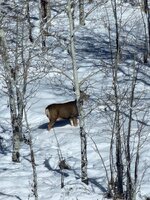 20231029_144504.jpg426.4 KB · Views: 110
20231029_144504.jpg426.4 KB · Views: 110
